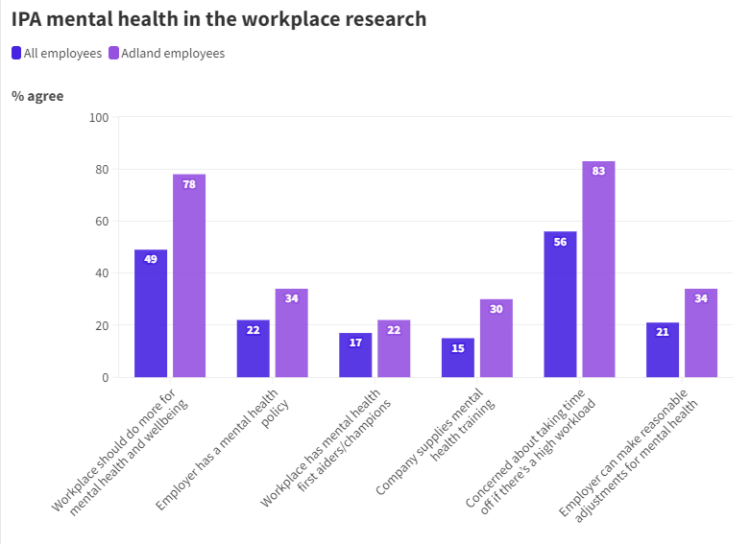Industry still has work to do on mental health

Most employees in the advertising, marketing and PR industry think their workplaces should do more to support mental health, according to new research.
The IPA conducted a survey into the awareness and availability of mental health support for UK employees — both at a national level and within the ad industry — as it announced the launch of two new mental health initiatives today.
Its report found that more than three-quarters (78%) of advertising employees agreed their workplaces “should be doing more” to support mental health and wellbeing, compared with 49% of the nationally representative group.
Only one-third of adland employees (34%) said their employer had a mental health policy or had the ability to make reasonable adjustments to support mental health.
An even lower proportion reported that advertising employers provided mental health training (30%) or had mental health first aiders or champions (22%).
A higher proportion of those in advertising, marketing and PR were “concerned” about taking time off if there was a high workload compared with the wider group, at 83% versus 56%.

Analysis: Change needed
Chris Dunne, head of marketing at Thinkbox and a Future 100 member, presented a winning manifesto last year about the importance of mental health first aid training for leadership in media and advertising.
Speaking to The Media Leader, Dunne said the IPA’s new initiatives and a “people first” position from IPA president Josh Krichefski were “really encouraging” at a time when there were so many pressures on the industry.
He added: “As an industry, we still have some way to go until we’re able to talk about our mental health in the same way we do our physical health.”
Crucial action
Dunne highlighted that mental health training needs to focus on leadership teams.
He continued: “I firmly believe that the wider adoption of mental health first aid training, particularly at the senior level, is a simple but necessary first step in reducing stigma and changing workplace culture.
“I’d like to see more of our industry’s leaders getting themselves trained, committing to training more of their people and protecting funding for mental health initiatives that are proven to make a material difference.”
Uzma Afridi, principal business psychologist at industry wellbeing charity Nabs, told The Media Leader there were several “crucial actions” for organisations to take in order to better support the mental health of their teams.
She said: “There’s an urgent need to open up the conversation around mental health: our survey found that 35% of respondents felt unable to discuss mental wellness in the workplace, with greater numbers of early careers and those from under-represented groups impacted.”
Training for newly promoted line managers and inclusive management practices would also help fix the “broken steps on the management ladder” and close the “lived experience gap” that is leading to stress and anxiety, Afridi added.
Widespread stigmatisation
Last year, Nabs found widespread stigmatisation around mental health at work among employees in its All Ears report. The study found that 71% of respondents agreed mental wellness needed “more focus” in the industry.
Another finding was that just over one-third felt unable to discuss mental wellness in their workplaces. This was the case for early-career participants as well as C-suite executives and department heads, with worries over colleagues’ reactions or negative impacts on their careers.
The Nabs report also found that stress, burnout and anxiety were prevalent, even “normalised”, across the industry, with demand for Nabs’ services increasing by 66% over the previous three years.
Speaking about these findings on The Media Leader Podcast, Nabs CEO Sue Todd said advertising, media and marketing was “in the eye of the storm” when it comes to mental health, given the tremendous change around work culture in recent years, combined with the industry always being at “the forefront of social, technological and cultural change”.
Emotional support was the number one reason for people reaching out to Nabs, she added.
Todd explained: “The core of what this survey tells us is we need to move a bit faster or acknowledge the speed and difficulty of the things we are grappling with.”
‘Triage not treatment’: how managers can improve mental wellness, with Sue Todd and James Appleby
Long way behind
In a panel at The Future of Media 2023, Dunne, along with GroupM executive and founder of mental health support programme ImNotOK Paul Rowlinson and Nabs’ director of wellbeing services and culture change, Lorraine Jennings-Creed, discussed the state of mental health in media.
For Rowlinson, it was “lagging behind” other industries like banking, insurance, law and management consultancy.
He explained: “We are way behind and I think there’s pressures from clients. We are a very young industry as well, so I think there’s a lot of challenges that have come about because of Covid and hybrid working as well.
“But it’s also given us the licence to talk about this stuff. I don’t know if I would have felt comfortable talking about all of this four or five years ago. What I do know is that our industry as a whole has got an awful lot of work to do to support its people better.”



